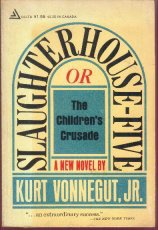
Slaughterhouse-Five
Kurt Vonnegut
215 pages
published in 1969
Back in the days when I read every book in the local library which had that little squiggle on it that meant it was science fiction, I read and reread a hell of a lot of Vonnegut. Books like Breakfast for Champions,God Bless You, Mr. Rosewater, Slapstick and of course Slaughterhouse-Five. At the time I read them without any consideration of their literary status, but simply because Vonnegut was a science fiction author and I read science fiction, even if much of the Vonnegut novels I read weren't quite science fiction. I liked them for their cynical black humour and inventive, seemingly slapdash plots.
Rereading Slaughterhouse-Five some twenty years later it's easy to see why it made such an impression as a work of literature and why it's so popular with generations of English students. It's chock full of the sort of symbolism that makes it an easy book to dissect in a student essay. However, that also makes it hard to write about now, almost forty years after its first publication, because so much has been written about it already. I don't want to write a review that comes over as yet another student paper.
Let's take for granted that most people who'll read this page after casually googling for this book will already have learned from Wikipedia that this is the novel in which Vonnegut attempts to work through his experiences as a prisoner of war in Dresden in World War 2, where he was caught up in the firebombing of Dresded, which annihilated the city and its population. We'll take it as read too that Slaughterhouse-Five was the place Vonnegut was interned and was a disused slaughterroom far enough below ground to survive the firestorm. Finally, it should be obvious that this experience left Vonnegut somewhat ...cynical shall we say, about humanity's better nature.
It's the form in which Vonnegut puts his disillusionment that's so interesting. He wouldn't or couldn't put his experiences into a conventional memoir or novel, so instead he made poor Billy Pilgrim come unstuck in time: the story of what happened in Dresden is intercut with scenes from Billy's earlier and later live, with his kidnapping by aliens from Tralfamadore as the other focal point of the book. In this way you could say that the absurdity and horror of Pilgrim's experiences during the Dresden Firebombing is echoed throughout his life; it's what the rest of his life revolves around.
It's in the Tralfamadorian view of time that Vonnegut's philosophy is revealed. Unlike us humans, who experience time as a steady progression, the Tralfamadorians see time as a whole, with no past, present or future, just separate moments on which you can focus or not. In their philosophy it doesn't do to worry about what's going to happen, because it's just as immutable as what has happened already. Hence their favourite saying: so it goes: forget the bad moments, focus on the good because you cannot change either of them. What happens happens because that is the moment that happens and there's no cause or effect.
This is not as nihilistic as it sounds at first. In the novel, this philosophy is there to stress the absurdity of Billy Pilgrim's experiences. His whole life he's little more than a powerless spectator, while things -horrible or pleasurable or otherwise- happen to him. It's a way to remain sane in an obviously insane world.
Rereading Slaughterhouse-Five I was struck by how oldfashioned it seemed, how much more a product of its time it looks now than the first time I read it. It comes across as much as a reaction to the confirmity and casual brutalism of American life of the "pre-hippie" sixties as it does as a response to Vonnegut's Dresden experiences. It was a much more quicker read than I had expected, but also slightly disappointing. The sting had gone out of it. Perhaps than this is a novel you need to read when you're twelve or fourteen or sixteen or so and just realising how horrible the world can be.
Read more about:
Kurt Vonnegut,
Slaughterhouse-Five,
science fiction,
book review